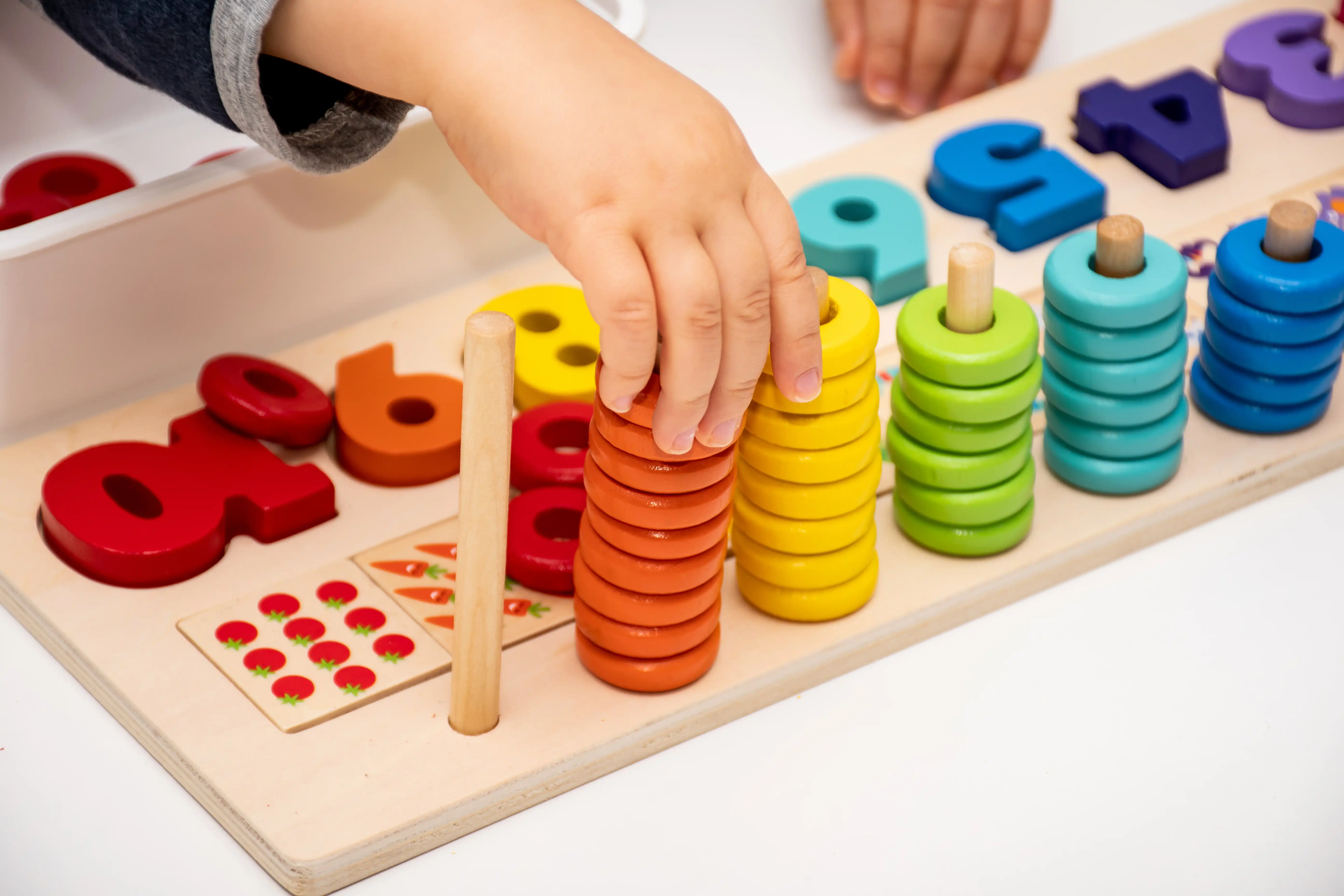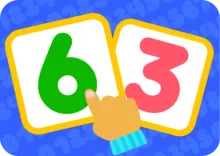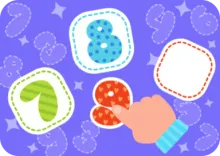Math Activities for Preschoolers: Fun Number Learning and Counting
Math activities for preschoolers can be simple, hands-on, and fun. These ideas help kids practice counting, sorting, patterns, and early number sense using everyday objects and short play routines.

Math activities for preschoolers to build early number skills
Math is an exciting and valuable school subject that broadens horizons. For kids, this endeavor may be challenging to grasp instantly; it requires daily practice from the very birth. At the same time, parents must maintain persistence and help their kids facilitate the learning process. Introduce your little one to math activities for preschoolers, explicitly designed for fun and productive training sessions.
Introduction to Preschool Math Activities
Your child develops daily, progressing in basic abilities and gaining knowledge of their surroundings. They accomplish certain milestones at every age. From babyhood to toddlerhood, your kid acquires different essential skills and abilities to help them navigate life.
Preschoolers are highly active, emotional, curious, and enthusiastic about exploring everything. From a cognitive perspective, they are at Piaget’s preoperational stage, manifested in symbolic play. Basically, this means kids learn to use symbols without comprehending concrete reasoning, which is required for math.
During preschool, children have already gained the basic physical, social, and educational competencies. The next step is to prepare them for school with more complex exercises to help them understand higher-level academic subjects.
One of the most important subjects is math, providing a new outlook on the world. Unfortunately, many little students face challenges when learning it for numerous reasons. This is where parents can facilitate this process by introducing them to preschool math activities at home.

Help your child
grow with Keiki
We’ll help you turn everyday screen time into real learning progress.
Try KeikiImportance of Early Math Education
Math doesn’t immediately begin with complex equations and tables at school. The introduction to this important subject forms from early infancy with simple actions. From the moment they’re born, babies start exploring the world of math. While they can’t yet grasp the idea of algebra, they are able to understand sizes and sequences. At this stage, parents can come up with on-the-spot mini-activities, like counting kids’ fingers or toes.
Due to toddlers’ high curiosity, parents are advised to start actively engaging them in pre k math activities. Kids begin reciting numbers, recognizing basic shapes, and answering simple questions related to counting, like “How many fingers do you have?” This is the perfect stage for learning math by introducing them to basic concepts.
Preschool age is a key phase in improving math skills. Around this time, based on the previous knowledge, children can confidently count from 1 to 20 and learn the days of the week. They can listen and react to multistep instructions, which aids in learning to add and subtract.
Beyond mere number proficiency, early arithmetic classes promote the following:
- Cognitive development. This includes problem-solving abilities and logical reasoning. With so much valuable knowledge, children can think critically and handle some challenges independently.
- Better understanding of the world. When kids learn about measurement and quantities, they can understand how things work. This lays solid groundwork for grasping the idea of time, quantities, and sizes, essential for forming a bigger picture of the world.
- Creativity boost. Math and creativity may seem counterintuitive at first. But when you dive deep into their connection, you’ll be surprised. When trying out various solutions to a problem, children develop their imagination and thinking.
- Increased chances of successful academic performance. With a strong command of elementary math concepts, children can step into this subject confidently in school. Besides math, numerical skills are critical for grasping physics, chemistry, and programming.
By engaging children in math ideas for preschoolers, parents can help them form a positive attitude toward math from the beginning. As this subject is complicated, understanding it instantly is challenging. If not facilitated and explained, kids may hate it and refuse to participate in the exercises. This early exposure to the numerical world, with parents’ support, can substantially streamline their future academic performance.
Benefits of Hands-On Learning
Children love playing with toys. While it may seem a mere enjoyment, this activity helps little minds explore, experiment, and discover things independently. In the same way, hands-on math learning lets kids better understand numerical concepts.
Manipulatives and scaffolded lessons allow for a seamless transition from the concrete to the abstract, presenting demonstrative examples. This visual element significantly facilitates the learning process, making understanding easier. Moreover, it stimulates brain activity, creativity, problem-solving abilities, and emotional development.
For instance, parents can use colorful building blocks to help kids learn numbers. In addition, sorting shapes and counting with physical numbers will improve fine motor skills and eye coordination, reinforcing all-encompassing development. On top of this, kids will enhance their language while describing their actions and reasoning.

Preschool Math Games: Fun and Engaging Math Activities
Children’s innate curiosity at the preschool stage makes it an excellent time to become familiar with fundamental arithmetic concepts. As play remains the main channel of exploring this world, engaging in enjoyable sessions with math games preschool can help facilitate the learning process.
Counting and Number Recognition
During preschool, kids learn to associate written numbers with their corresponding verbal word for that amount. While they can’t yet understand the bigger picture behind this concept, children move forward to its comprehension by engaging in playful numerical activities:
- Building number towers. In this exercise, show your child how to match a number card with a tower of cubes. Ask them to do the same with another card and count the numbers. During the process, they’ll have a great time and learn how to grasp numbers visually and tactically.
- Hopscotch counting. While engaging in a playful physical game, children reinforce their knowledge of number sequence and recognition. They improve their language and visual identification as they say the numbers aloud and land on each square on a grid.
- Counting walk. This is a perfect activity for daily exercises. It entails counting different objects while casually walking outside. Such a simple but effective practice will enhance observation and counting skills.
As your child progresses, you may tweak these exercises and make them more complex. This will help them build and enhance their math skills and their thinking abilities. It’s also important not to go overboard; keep the sessions short but productive.
Shape and Pattern Recognition
The ability to recognize geometrical figures and patterns is essential for preschoolers. They lay the foundation for further understanding of math concepts in visual and tactile form. To develop those skills, consider the following fun activities:
- Shape sorting. Lay down several objects with different shapes. Encourage your child to categorize them based on their forms. This exercise promotes classification skills and helps kids reinforce the previous shape knowledge.
- Part card sequencing. This one deals with identifying and extending patterns focused on enhancing analytical skills. Show your child cards and manipulatives, and then discuss each sequence. Ask them to use props to continue the pattern and create their own layout. This practice is valuable for understanding patterns, improving reasoning, and preparing children for more sophisticated math ideas.
- Drawing shapes. Let your kid engage in captivating creative activity while enhancing their ability to recognize shapes. Based on their skills, you may provide templates or just encourage them to start freehand drawing. Besides geometrical introduction, this training also focuses on promoting spatial awareness.
Practicing math can be an enjoyable experience. These exercises will help add a play element to the learning process while developing essential numerical competencies.
Measurement and Comparison Games
The development of foundational math skills involves the comprehension of measurement and comparisons. From the early years, children learn many concepts like size, length, height, weight, and quantity. This knowledge can be reinforced by engaging in the following games:
- Scavenger hunt. Ask your child to find objects of a particular length or size (smaller/longer, bigger/smaller) than a given reference. During this training, they’ll use critical thinking to identify items and make comparisons.
- Guess the length. Put several objects in sealed bags and encourage your little student to estimate their length only by feeling them. Any peeking is forbidden. Ultimately, they can take them out, measure their actual lengths, and compare them. As a result, they improve their sensory, imaginative, and vocabulary development.
- Outdoor measurement. Take your child outside and encourage them to compare the lengths of different surrounding objects, like leaves, branches, or rocks. In addition to active movement and tracing real-life math applications, this activity allows parents and children to bond.
Learning math shouldn’t be boring, with only books and worksheets. By engaging in games, your child will be more engaged in the learning process, as this valuable play element is important for facilitating math training.
Help your child thrive with playful learning
Turn screen time into real growth with Keiki’s educational games.
Try KeikiMath for Preschoolers: Tips for Parents and Educators
You’re proud to see your child making significant milestones daily. As a caregiver, you become the primary teacher for your child from early babyhood. Basically, you’re given a miraculous opportunity to help your kid learn essential skills and build a mindset for further development. Therefore, considering tried and true tips will provide valuable insights and allow for tweaking teaching approaches.
Encouraging a Positive Math Environment
When engaging in a preschool math activity, children may quickly become upset with their failures. They may feel unpleasant emotions about the subject. In such sensitive situations, you need to create a safe and friendly environment where instant results don’t measure success. Instead, let your kid enjoy the process itself and praise their efforts. Emphasize the joy of gaining new knowledge and expanding their horizons.
Positive reinforcement is great for showing affection and celebrating your child’s progress, including hand claps, exclamations, and hugging. Ultimately, all the interactions must be positive and show your natural eagerness to help your kid.
Making Math Fun and Relatable
Parents can instill a love for knowledge and lay a strong groundwork for their child’s future mathematical comprehension. They need to make learning accessible and engaging. Introducing your child to pre k math games will help achieve these goals. Simple activities, like puzzles, measuring, and comparisons, can be enhanced with a play element. Furthermore, storytelling and songs can facilitate an introduction to addition and subtraction and make the whole process enjoyable.
Math training can also be naturally integrated into daily routines, improving learning effectiveness. Regular walking and counting surrounding objects, grocery shopping, and simple cooking all contribute to reinforcing math knowledge. By showing real applications, you’ll help make the academic subject more relatable to your child. Hands-on training is also excellent for presenting visual components and associating them with math concepts.
Related Games in Keiki App
Keiki World: Math Preschool Activities and Games
If you’re looking for an app with a comprehensive list of focus areas for preschoolers, Keiki World is a perfect choice. You can find diverse content for productive and fun learning sessions for kids of all ages. Math is one of the essential subjects in the app’s offerings, providing little students with practical and entertaining activities. There are different packs and materials that promote multiple aspects of math development:
- Counting Basics. It focuses on elementary counting, essential for early math skill growth.
- Numbers and handwriting. This content focuses on number recognition with handwriting practice, fostering fine motor skills and numeric competency.
- Preschool worksheets. Various lesson plans cover multiple aspects of early math learning, providing plenty of practice opportunities.
- Creativity boost. For improving imagination and thinking abilities, the app offers coloring pages for creativity and logic development.
- Games. You’ll find many fun and valuable games, including puzzles of different levels, Numbers Seek and Find, and a Tetris Party, that can teach your child math and guarantee a fun time.
The app’s math games for pre k are carefully created to help littler learners reinforce number recognition, counting, and basic calculation skills. In addition, the developer considers the unique needs of children with ADHD by providing specialized content with valuable tips for parents to streamline the learning process. With Keiki, you get an all-encompassing interactive app where you and your child can learn and bond when engaging in fun games and activities.
Conclusion
Math is an exciting journey into a myriad of new opportunities and a challenging endeavor that requires preparation and practice. By showing the preschool kid the fun part of learning math concepts, parents can facilitate the educational process for those little minds. Let your child explore the fascinating numerical world in an enjoyable and easy way.














